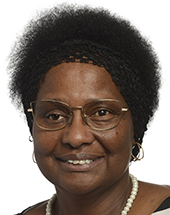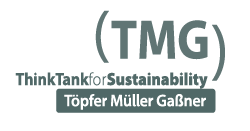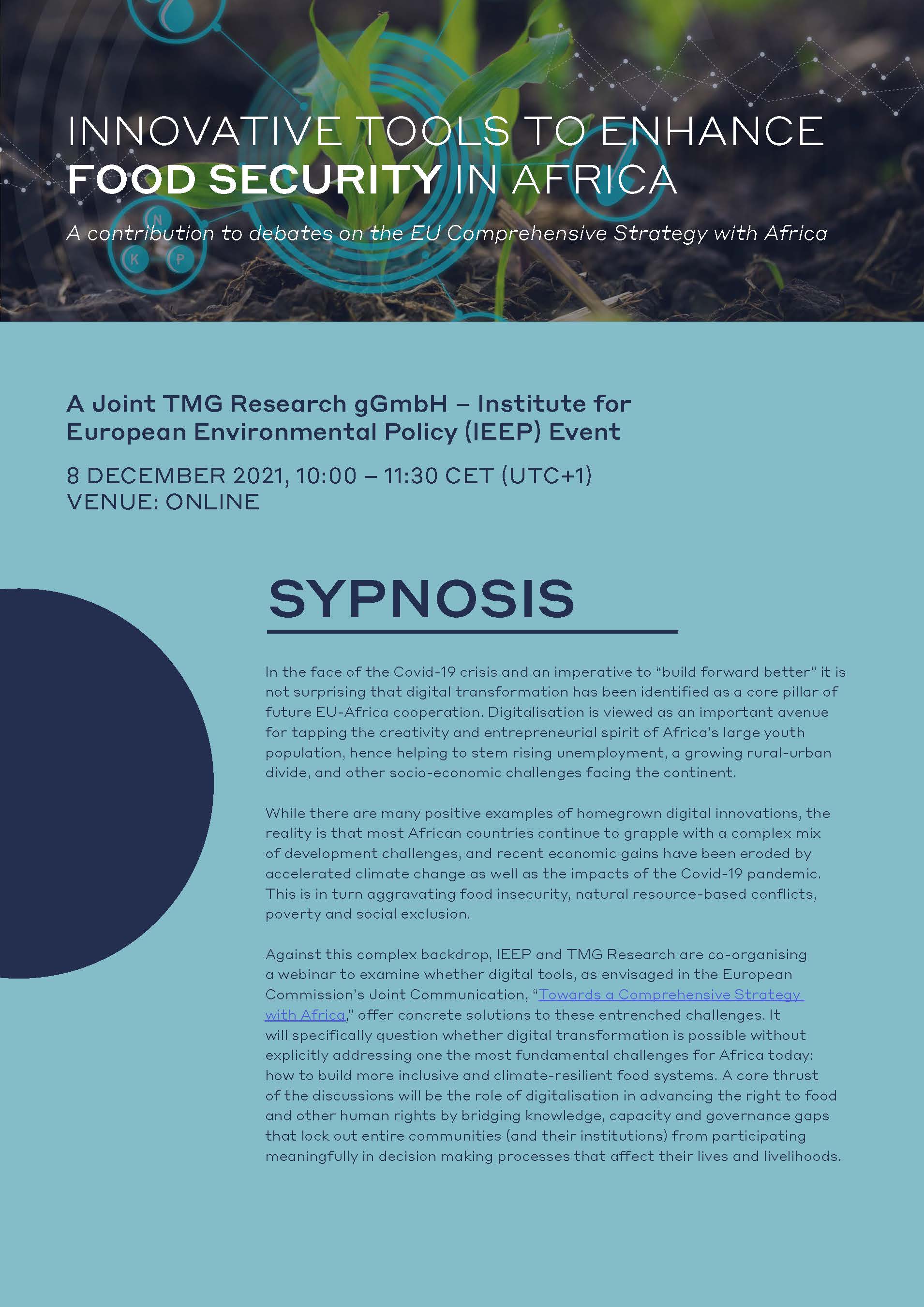Discussion
Innovative digital tools to enhance food security in Africa
A contribution to debates on the EU Comprehensive Strategy with Africa
Co-organised by TMG Research gGmbH and the Institute for European Environmental Policy (IEEP), this event aims to create a discussion on the potential as well as challenges of digitalisation as an accelerator for food security in the context of African-European cooperation. The event aims to generate specific proposals on how to better integrate digital tools into policies and programmes to strengthen food security and the progressive realisation of the right to food in African countries.
The event is organised under the auspices of Africa-EU negotiations towards National and Regional Indicative Programmes under the EU Multiannual Financial Framework (MFF 2021-2027), and the upcoming EU-Africa Summit in early 2022.
By scrutinising portrayals of digitalisation as a “silver bullet” for addressing the many repercussions of the COVID-19 pandemic, the discussions will seek to pinpoint potential pitfalls in current EU policy frameworks, notably the European Commission’s Joint Communication “Towards a Comprehensive Strategy with Africa.” Our starting point is that digitalisation alone cannot tackle the multifaceted and structural challenges that continue to undermine sustainable economic development on the continent. With a focus on food security as one such fundamental challenge, we will explore the importance of rights-based approaches in promoting climate-resilient food systems that strengthen societies and restore the agency of African populations in driving decision making on Africa’s future.
Speakers at the event will be drawn from key stakeholder groups, including the European and African Union Commissions, regional think tanks and civil society networks.
This event is part of a cooperation between TMG Research gGmbH and the Institute for European Environmental Policy (IEEP), a sustainability think tank with a 40-year history. The event is organised in the context of the SEWOH Lab project, with financial support from the German Federal Ministry for Economic Cooperation and Development (BMZ).
Read more about the Africa-EU Partnership.
The Covid-19 pandemic has deepened already worrying trends of increasing hunger and malnutrition in Africa. According to the latest State of Food Security and Nutrition in the World (SOFI, 2021) report, approximately 346 million people in Africa (21% of the population) experienced severe food insecurity in 2020 – more than double the proportion of any other region. This represented an increase of almost 46 million hungry people in just one year. If the number of moderately food insecure people is factored in, then close to 800 million people (roughly 60% of Africa’s population) is at risk of hunger and malnutrition.
Vulnerability to hunger is further pronounced in countries affected by conflict, climate extremes or economic downturns, or with high inequality. The bulk of food in Africa is produced by smallholder farmers, who also continue to be among the population sectors most affected by food insecurity. Climatic variability and poor post-harvest management, as well as infrastructural challenges and supply chain inefficiencies, all contribute to food loss and wastage, and rising food costs. It is further estimated that three-quarters of Africans cannot afford a “healthy” diet and 51 percent cannot afford a “nutrient adequate” diet. According to SOFI 2021, Africa experienced a 12.9 percent increase in the cost of a healthy diet between 2017 to 2019, the highest in the world. Moreover, as one of the regions (with Asia) bearing the greatest share of all forms of child malnutrition, Africa experienced a 49 percent drop in coverage of essential nutrition services in 2020, compared to 27 percent for Asia.
The Covid-19 pandemic has not only exposed the vulnerability of African food systems, but the underlying structural and governance barriers that undermine the emergence of inclusive and resilient economic development on the continent. If current trends are maintained, the region is highly unlikely to achieve the Sustainable Development Goal on Zero Hunger (SDG 2). While most parts of the world are recovering from pandemic-related economic setbacks, Africa is projected to experience a “significant increase” in the number of hungry people by 2030.
The European Commission’s proposal for a new comprehensive strategy with Africa fails to make a link between two key development challenges: achieving food security and digital transformation.
Even without this current pandemic, the Strategy has not learnt from the 2011 global food crisis, by not addressing adequately the issues of food security and the role of local agricultural production in Africa.
The joint communication “Towards a comprehensive Strategy with Africa” elaborates on a partnership on digital transformation between Europe and Africa. This proposed partnership acknowledges the role of digitalisation as a driver for growth across all sectors of the economy. Yet, the specific aspects of digitalisation that are highlighted refer to e-governance and delivery of public services, e-commerce and the digital financial services, and cyber security. An elaborate treatment of food security and the possible contribution of digitalisation in overcoming it is missing.
Given the severity of the hunger and malnutrition crisis in Africa, this disconnect is an omission that needs to be addressed in the further negotiations on the strategy and its future implementation.
In its response, the European Parliament acknowledges this shortfall of the communication. Specifically, it “calls for the EU-Africa partnership to focus its efforts in the agricultural sector towards safeguarding African countries’ right to food sovereignty. It further calls for prioritising increased food security, as well as enhancing African countries’ capacity to meet the nutritional requirements of their populations.“
Along similar lines, the high-level ministerial meeting preparing for the sixth EU-Africa Summit reaffirmed that a people-centred approach should be at the core of the AU-EU multi-stakeholder partnership. However, the European Parliament’s response expresses concern that “while the focus on creating jobs for the African youth is laudable, development in terms of digital skills and higher education is still more directed towards the middle classes, without concrete recipes to make African growth inclusive.” The resolution emphasises that the Strategy’s “top-down and trickle-down economic approach is at odds with supporting nation-led, localised and grassroots development, industrialisation and solutions for Africans.”
Harnessing digital tools to achieve Zero Hunger is about doing development digitally, not digitalising current food systems. The continuing fall in prices of mobile phones as well as access charges in African countries is often cited as a sign that digital technologies can help bridge in leapfrogging development challenges. Some of the benefits highlighted in diverse studies include:
Despite these opportunities, a number of reasons are cited for Africa’s continued struggle to “catch up” that can be broadly summarised as: connectivity, content, and capacity. While the list of promising examples is growing, digital technologies tend to mirror the same patterns of exclusion that are seen in most economic and social sectors. Prause et al. (2020) argue that “research should pay close attention to the challenges and opportunities of the digitalization of the agri-food sector for peasant movements, as well as to the development of digital alternatives, such as software products developed specifically for agro-ecological farming and digital farming communities, as well as those designed around the concepts of open-source access and data sovereignty.”
In other words, overcoming some of these challenges requires digital solutions that are tailored to the needs, and ‘speak the language’ of the most marginalised communities. A focus on digital access without adopting a “rights lens” will not lead to improved food and nutrition security.
A 2018 study by the Global Network for the Right to Food and Nutrition argued that the digitalisation of food leads to “an increasingly automated, delocalised and informatised process of production and commercialisation of food.” It noted that technologies in themselves are not detrimental to the right to food, but the problem lies with “how these are used and for which purpose.”
A 2020 report by the Heinrich Boell Foundation concludes that the pandemic has become “a moment of opportunism for Indian e-commerce companies to consolidate their market power, insert themselves into local supply chains and co-opt neighborhood stores.” It questions Covid-19 containment measures that categorised online retail platforms dealing in food, medicine, and medical equipment as essential services, while locking out non-profit initiatives such as the Food Corporation of India, “the agency that the poorest depend on for food rations.” The report calls for a “re-imagining” of digitalisation as a public good by supporting locally embedded “e-commerce platform marketplaces” owned, for example, by federations of small-scale producers and retailers. The report suggests that, with policy and financial support, such platforms can play a strong role in reviving local economies due to their integration to local production and consumption.
Innovative digital tools to enhance food security in Africa (Highlights)
A contribution to debates on the EU Comprehensive Strategy with Africa
Dec 17, 2021
Innovative digital tools to enhance food security in Africa (Event Recording)
A contribution to debates on the EU Comprehensive Strategy with Africa
Dec 08, 2021

Barend Erasmus
University of Pretoria

Elizabeth Kimani-Murage
Maternal and Child Wellbeing, African Population and Health Research Center (APHRC)

Leonard Mizzi
European Commission Directorate-General for International Partnerships (DG INTPA)

Mawaki Chango
DigiLexis Consulting

Pierrette Herzberger-Fofana (TBC)
European Parliament

Sebastian Lesch
German Federal Ministry for Economic Cooperation and Development

Tunde Fafunwa
UNECA Digital Centre / Kitskoo Inc.


